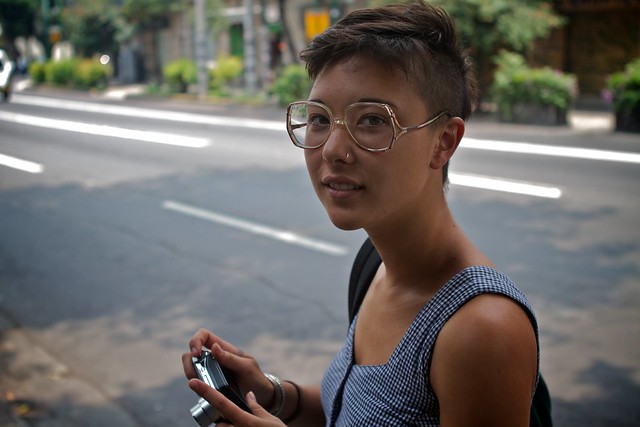I’ve been thinking lately about fashion and class. It’s Mario’s fault. He’s the kind of friend you can sit down with for hours over a few microbrews to discuss the evolution of advanced capitalism through the lens of hipster fashion. I’m still not really sure what that means, but the man does have great taste in beer and threads, and he has me thinking about a thing or two. I live in Condesa, not far from the border with Roma, hipster mecca of Mexico City. It’s where you find people dressed like this.
It’s one of the few places where my little sister, looking like she does these days, fits right in. Like others in her aesthetic cohort, I’m amazed by the time, energy, and nonchalance that goes into perfecting the image. I love the creativity behind the impulse, and yet am frustrated by the vanity.
Did I mention that just about everything costs double in my neighborhood? Rent, food, a cup of coffee. This is a place for the middle-upper class, the young and the restless, the type of kids with enough money to spend entire days in thrift stores to be seen at parties looking like this:
Despite the working class, bohemian aesthetic, most of these kids are the sons and daughters of CEO’s and politicians. And most of them were raised in the gated communities of upper-class suburbs like Santa Fe. My theory is that growing up surrounded by suburbs and sitcoms is venom for the creative soul. It’s a plague that affected so much of my generation. So we moved from mass-manufactured, cookie-cutter houses to Silver Lake, the Mission, Williamsburg, West Oakland. But unfortunately, for so many, ‘creativity’ meant dressing up like this to go to parties, to create an ‘alternative scene’
If only a small percentage of that creativity could be channeled into something that goes beyond supporting beer and cigarette companies.

David Sasaki is the Director of Rising Voices, a global citizen media outreach initiative of Global Voices Online.
He manages a portfolio of small-scale projects around the developing world that use citizen media to effect social change.
Prior to his current focus on outreach, he served as Global Voices’
Latin America Regional Editor, monitoring the Latin American blogosphere, highlighting key content and translating select posts from Spanish to English.
Sasaki transitioned into online journalism after working as a freelance
web developer and English instructor in Monterrey, Mexico. He now splits his time and residence between North and Latin America and writes frequently at Rising Voices, Online. He manages a portfolio of small-scale projects around the developing world that use citizen media to effect social change.
Prior to his current focus on outreach, he served as Global Voices’
Latin America Regional Editor, monitoring the Latin American blogosphere, highlighting key content and translating select posts from Spanish to English.











